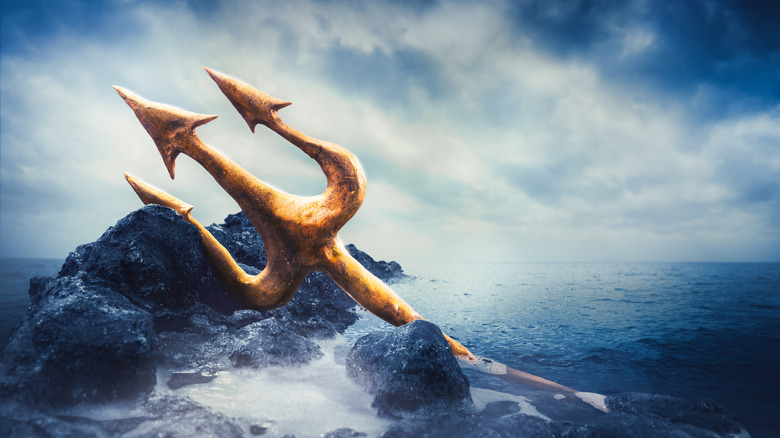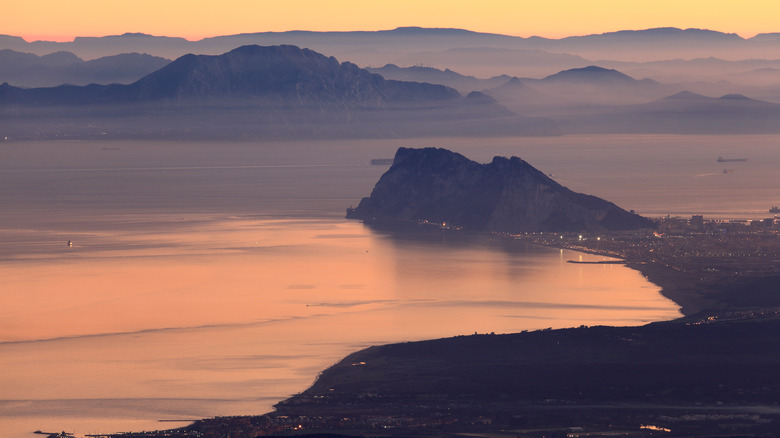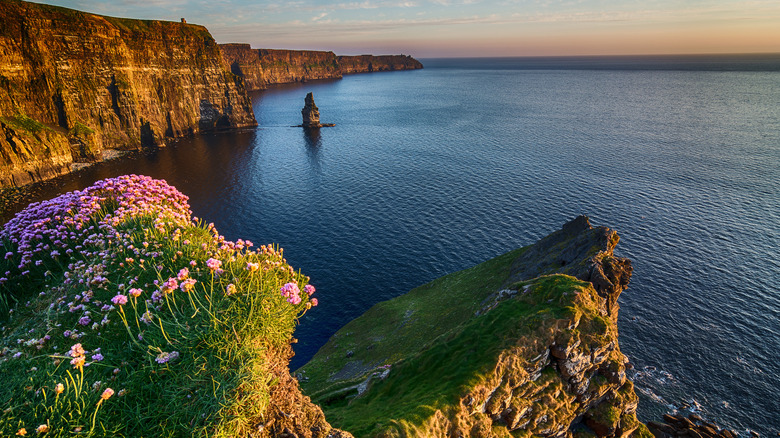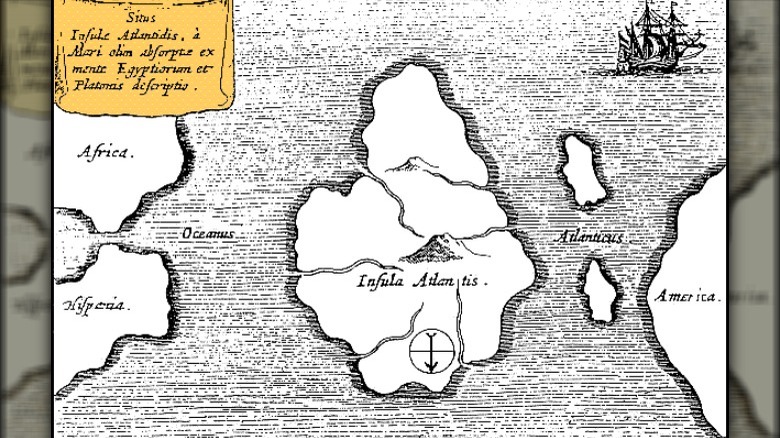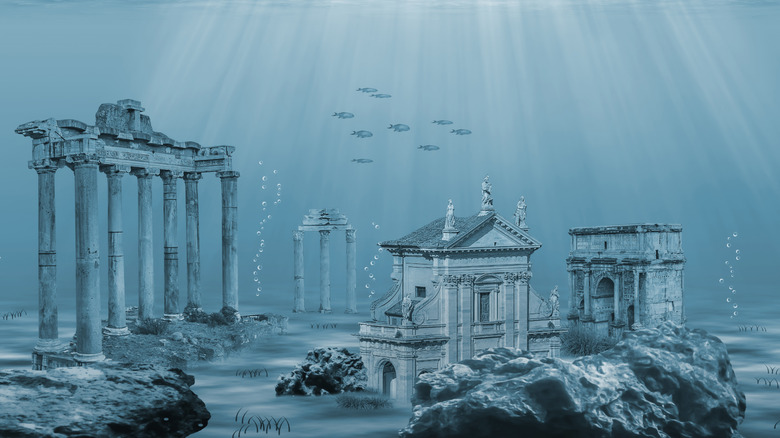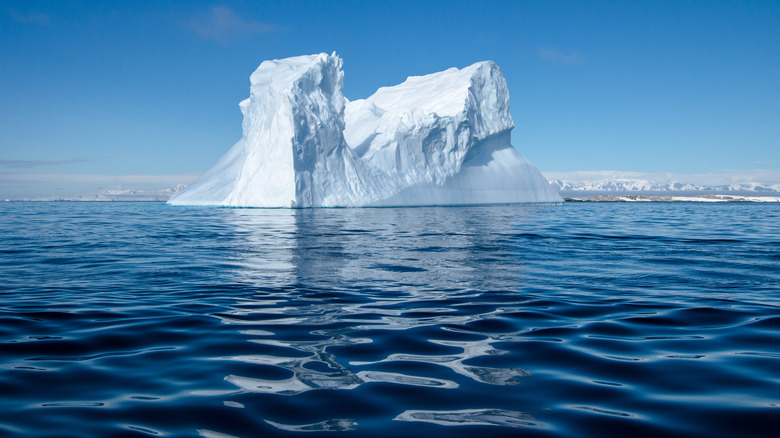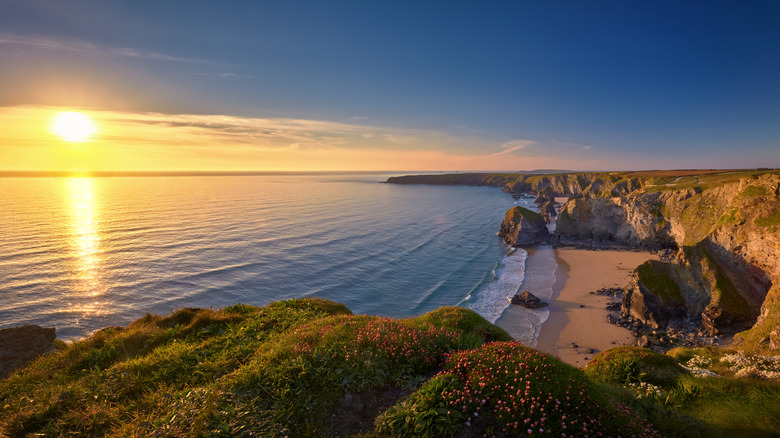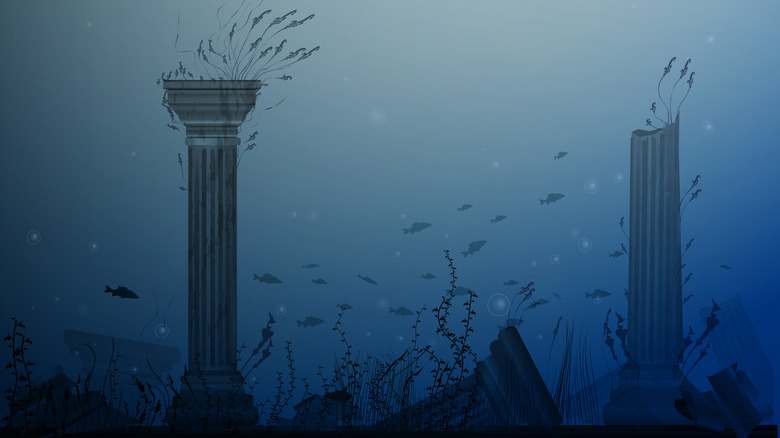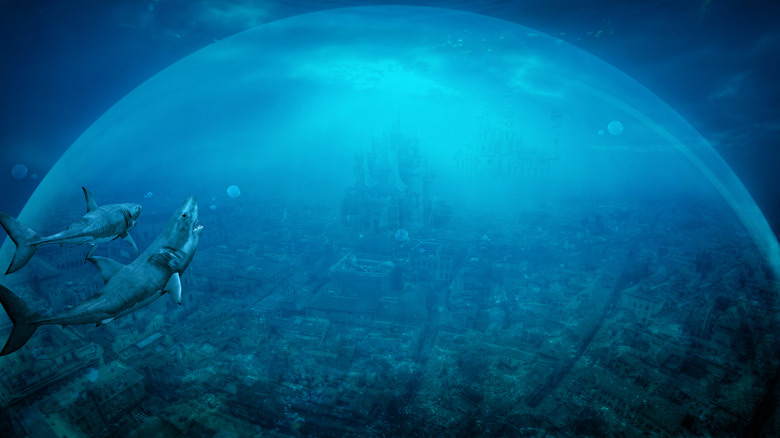The Best Theories We Have About The Lost Continent Of Atlantis
Few stories have had the sheer staying power of the tales of Atlantis, the super-advanced utopian society that disappeared beneath the waves thousands of years ago ... or, so the story goes. That story was said to have originated in ancient Egypt, passed down through oral tradition to the Athenian politician Solon and finally to Plato, who wrote it down in about 360 BC. But what was actually written about it, anyway?
According to National Geographic, Plato described it as a powerful utopia, built on a series of islands and inhabited by a race of demigods who had everything they could possibly want, right at their fingertips. All good things must come to pass, though, and over the years, Atlantis's inhabitants became less god and more human — in other words, they did a long, slow slide from moral superiority into everything that's bad about people. The gods they owed their existence to weren't about to stand for that, and destroyed the entire thing in one cataclysmic night.
Plato wrote that the city of Atlantis was located in the Mediterranean, near "the Pillars of Hercules." History says that's what we now know as the Strait of Gibraltar, but over the centuries, historians, folklorists, and adventurers have claimed Atlantis was, well, pretty much everywhere. While it's obviously never been found, there are some pretty good theories about just what Plato was getting at — and some are rooted in terrifying historical fact.
It was a reference to the island of Santorini
Robert Ballard has some serious explorer cred — he's the one who found the Titanic. He told National Geographic that, while no one actually believes Atlantis was a real place as it was described by Plato, the story of an entire civilization and island being wiped out in a cosmic heartbeat has been absolutely and repeatedly true.
That said, one of the most intriguing possibilities is that Atlantis was inspired by the real-life destruction of the Minoans. They — like the Atlanteans — were a ridiculously advanced society with far-flung military conquests and trade routes, until suddenly, they weren't. It's not entirely clear what happened, but one of the premier theories is that the eruption of a volcano did widespread and irreparable damage to critical infrastructure and trade routes. The cataclysm would have been ancient at the time Plato was writing — it took place around 1600 BC, about 1,300 years before he was born — and although Ballard stressed that we can't know what Plato specifically had in mind, it's still a favorite theory.
And here's the thing: Santorini is still inhabited, and it's one of those paradise-on-earth kinds of places. Seriously, it's breathtakingly beautiful, but that volcano is still active and just waiting for an encore. In 2022, researchers from Imperial College London (via Geochemistry, Geophysics, Geosystems) detected activity to lead them to the conclusion that the threat of another eruption and another devastating tsunami isn't a matter of "if," but of "when."
Spartel Island
Strip away all mentions of a utopian society populated by demigods, and Atlantis is the story of an island in the Strait of Gibraltar, somewhere between what's now Spain and Morocco, that disappeared after a major natural disaster. And that's not super far-fetched. Stranger things have happened in the natural world, after all, and in 2001, researchers from the University of the Mediterranean (via New Scientist) actually found an island right where Plato said it would be.
Jacques Collina-Girard was studying the rise and fall of ocean levels, in order to see what impact it would have on the ability of ancient humans to travel between continents, when he discovered a swath of land that used to be an island. It's called Spartel, and not only is it exactly where Plato described Atlantis as sitting, information gleaned from the area's corals indicated rising sea levels completely submerged the island about 9,000 years before Plato — precisely when he described Atlantis as sinking.
Although the sizes given don't match up, it's argued that's just a translation error — and further study published in Nature in 2005 provided some additional food for thought. That's when researchers from the European Institute for Marine Studies found that it wasn't just rising sea levels that sank Spartel Island, but an earthquake and tsunami hit at about the same time. Although Spartel wasn't big enough for an Atlantis-sized civilization, it may have been the inspiration for Plato's end-of-days scenario.
Ireland
So, here's a weird one. According to Ulf Erlingsson from Uppsala University (via The Guardian), Atlantis didn't actually sink. He knows this, he claimed in 2004, because Ireland matches up pretty well with Plato's description of the ancient island. In addition to being the right size, Ireland has the right layout, too: Mountains and hills around the outside, and large, flat spaces on the inside.
The Irish Times says there's a bit more to the theory, and Erlingsson theorized the ancient civilization that Plato was writing about was the same civilization that left megaliths, Newgrange, and sacred sites like the Hill of Tara. He also linked Plato's Atlantean rulers with Ireland's ancient kings, and as for the whole sinking thing, he explained that, too. It was a misunderstanding, and Plato combined the stories of this ancient kingdom with the disappearance of the nearby Dogger Bank, which was consumed by the North Sea about the same time Atlantis was said to have disappeared.
The idea never really got any traction, but there is an interesting footnote to this. Just like Greece had Atlantis, Ireland has long told stories of their own mysteriously sinking island, Hy-Brasil. Folklore tells of an island of mythical creatures that randomly appears somewhere along the coast, and although it can grant everlasting life, it sinks beneath the ocean whenever anyone tries to approach it. Fantastic accounts of Hy-Brasil have been told for centuries, and it's even shown up on completely legitimate maps as early as the 1300s, according to IFLScience.
It's right here on this map. See?
The Atlantis story got a major boost in popularity around the time Europeans discovered the New World, and according to the University of King's College Halifax, there was a pretty practical reason for trying to connect the two: If the New World was Atlantis, then it must already belong to Europeans. The result was a slew of claims that included drawing parallels between the origin stories of civilizations like the Aztecs and Atlantis, but perhaps the most interesting contribution to the legend was made by Athanasius Kircher.
He's a fascinating guy who subscribed to the medieval belief that the planet was something akin to a person: It had a visible skeleton in the form of mountains, a soul, and the waters were something like a combination of blood and oxygen. The tides and the rising and falling of water levels were seen as an indication that the planet was breathing, and when he made a map in 1664, he included Atlantis and the claim that the now-submerged island was a vital piece of the planet's skeleton.
In the context of what modern science knows about the planet, it sounds weird — but at the same time, it's a cool idea that Vox says actually had some long-running consequences. Even though the science was wildly inaccurate, it took something fantastic and gave it a scientific explanation — so even though he wasn't quite right, he definitely gets an A for effort, a gold star, and a scratch-and-sniff sticker of his choice.
The tragic end of Helike
Plato lived from about 427 to 347 BC, which means he would have lived through what had to have been one of the most terrifying natural disasters of the ancient world: The destruction of Helike in 373 BC.
Newcastle University's Guy D. Middleton says (via Aeon) that Helike was once a prosperous city located on the Peloponnese peninsula. It was a day like any other, until it wasn't: The earthquake hit first and leveled the city, and before a rescue effort even got underway, a massive tsunami finished what the earthquake had started. By the time rescue workers from nearby areas reached the doomed city, not a single body remained to be recovered. Gradually, time did the rest: Although stories of Helike — and studies of the connection between earthquakes and tidal waves — were written about for centuries, an ever-changing coastline and the passage of millennia meant that even the location of Helike was eventually forgotten.
The idea that Plato wrapped the tragic events of that terrible night into Atlantis seems like it's a given. Write what you know, after all, and here's the thing: Experts also point to a small, oft-overlooked detail in the Atlantis myth. The now-evil Atlanteans had just gone toe-to-toe with virtuous Athenians, and when disaster struck, the Athenian army was destroyed, too. Only nature and Greece's ancient gods could be so indiscriminately unforgiving.
Was it buried under the ice of Antarctica?
While it might be tempting to look back at our ancient ancestors and laugh about their silly ideas, it's worth noting that modern writers have had their share of weird ideas about Atlantis, too. In 1974, an Italian engineer wrote a book on a weird theory based on studies of the 16th-century Piri Re'is map. Studies in the 1950s had come to the conclusion that the map depicted an ice-free Antarctica, and Flavio Barbiero grabbed it and ran.
His theory is, well, complicated, but Skeptical Inquirer says the basics involve the idea that the earth was once tilted in such a way that the landmass that became known as Antarctica was ice-free. That changed with an extraterrestrial impact that shifted the planet's axis, and when ice enveloped the continent, the population fled in ships, scattering across the globe to teach other populations about their technologically advanced civilization. Atlantis, he says, was sort of covered with water after all — only it was the frozen kind.
It's a neat theory with points for creativity, but is there any actual evidence? Not really: That section of the Piri Re'is map wasn't even Antarctica in the first place; it was Brazil, moved and smushed on the page. It turns out that artistic license can cause quite a bit of trouble, but hey, thanks to global warming and melting ice, researchers might eventually be able to wade in and see if there are any ruins down there after all.
Little Sole Bank, Cornwall ... or maybe Bolivia
Here's a weird but fascinating one: In 1997, the BBC reported that there were plans in place for a major Russian expedition to explore a location about 100 miles from the Cornish coast. The underwater area is called Little Sole Bank, and the Russian team claimed that their analysis of Plato's texts made it clear that they were really, finally, going to be looking in the right place. Were they? They never found out, as Cornwall Live reported, the whole thing fell through because of a lack of funding.
Interestingly, though, another story has been pointed to as ... let's say "evidence," for the lack of a better word. That's the story of Lyonesse, a Cornish tale that bears a striking resemblance to the story of Atlantis. The Cornwall Guide says that Lyonesse was reportedly home to devoutly faithful and blessed people until — like Atlantis — it sank in a single night.
Still, that's not the end of the story. At the same time, the BBC reported that a British team was setting out on another expedition to find Atlantis in a totally different place: Bolivia. Weird? Sure, but for some reason, the idea has stuck. In 2016, Bolivian Express reported that Jim Allen, a British cartographer, was still convinced Atlantis was in Bolivia. He cited a similarity between Greek and Bolivian mythology, and a belief that the phrase "opposite the Pillars of Hercules" was actually a reference to South America.
Ignatius Donnelly's theories
Ignatius Donnelly was a U.S. congressman, a firm believer in the idea that William Shakespeare was the pen name of Francis Bacon, and in 1882, he published a book on his theories about Atlantis. They're ... well, they're definitely something.
Donnelly's "Atlantis: The Antediluvian World" did a deep dive into the similarities found in the mythologies of far-flung civilizations, particularly motifs like the great floods. He also made comparisons between languages, customs, the development of early tools, and architectural styles, and came to the conclusion that there were enough similarities to suggest all cultures stemmed from a single civilization. That civilization, he said, had been wiped from the planet — except for small groups of survivors who scattered after the destruction of their homeland, and spread their culture, beliefs, and technology across the globe. Donnelly even believed he knew where Atlantis was, and suggested the islands that were now called the Azores (pictured) were actually the very tops of the highest mountain peaks of Atlantis.
The reaction to the book was an interesting one, according to the Minnesota Historical Society, and it got attention from people including Charles Darwin (who didn't believe any of it), the Prime Minister of the UK (who was interested, but declined to send out the Navy to find proof), and an Irish bishop named James Donnelly, who condemned the work for including "symptoms of free-thinking."
It was a retelling of the Big Bang theory
Alan Alford is a writer and researcher who might promote ideas along the ancient astronaut lines of thinking, but his ideas about Atlantis are pretty novel and worth a gander. In 1998, he wrote a piece for the Independent saying he went back to what Plato claimed was the origin of the story: ancient Egypt. He said that the creation stories of ancient Egyptian mythology feature an island floating through space, and gods that descended to earth from that island. He suggests these stories came from very real phenomena, including meteorite strikes, and from there, he translates this mythology into Greek stories.
Atlantis was tied to the mythology of Poseidon and his sons, including Atlas. He's the one famously depicted as literally carrying the world on his shoulders, and he further goes on to explain that he believes the tale of Atlantis isn't about an island in the ocean at all, but one in the sky. From there, he suggests that the destruction of Atlantis was a retelling of the cataclysmic explosion that kick-started what we now call the Big Bang.
Alford says (via The Guardian), "Behind the tale lies a single secret of stunning simplicity: namely that although Atlantis was a lost paradise, it was not a lost city, island, or continent, but a lost planet of the former golden age. The loss of Atlantis was meant to signify a totally profound event — the cataclysm of all cataclysms that disrupted the universe at the beginning of time."
It was meant to be a parable
Atlantis has, of course, never been found. The most rational reason for this is also the simplest one: It never actually existed. National Geographic says that it's the nearly unanimous belief among the serious scientific community that Atlantis wasn't real ... but that's not to say that it wasn't important.
According to The Collector, Atlantis was understood to be no more or less than a morality tale almost immediately after it was written. It's suggested that it got so much traction as a potentially real place because of Plato's mention of real people as the source of the information, but that it was never meant to be anything but a reminder to stay on the straight and narrow. His Atlanteans had everything they could have possibly wanted, but greed, avarice, and the thirst for more and more power ultimately brought about their downfall — and the message here is clear.
Not convinced? There's one glaring detail that suggests Atlantis is entirely a work of fiction. Plato's tale sees Atlantis going up against the other Greek city-states in their relentless quest to conquer the world, and they're finally stopped by the Athenian army. The problem? Plato says that the story was set 9,000 years in the past ... but the first buildings found at the site that would become Athens only date to around 1200 BC. In other words, Athenians would not even exist for thousands of years after Atlantis reportedly got a big taste of fire and brimstone ... and earthquakes.
